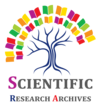Assessment of medication access and distribution in Nigeria: Challenges and opportunities for improvement
1 Independent Researcher, Port Harcourt, Nigeria.
2 Mediclinic Hospital Pietermaritzburg, South Africa.
Review
International Journal of Science and Technology Research Archive, 2024, 06(02), 083–090.
Article DOI: 10.53771/ijstra.2024.6.2.0048
Publication history:
Received on 04 May 2024; revised on 16 June 2024; accepted on 19 June 2024
Abstract:
Ensuring widespread access to essential medications is a critical aspect of healthcare delivery, yet Nigeria grapples with numerous challenges in this realm. This review presents a comprehensive assessment of the medication access and distribution landscape in Nigeria, highlighting both the existing hurdles and potential avenues for improvement. In Nigeria, inadequate infrastructure, including poor road networks and limited storage facilities, significantly impedes the efficient distribution of medications across the country. Moreover, the prevalence of counterfeit drugs further exacerbates the issue, posing grave risks to public health and undermining trust in the healthcare system. These challenges disproportionately affect rural and underserved communities, exacerbating health disparities. However, amidst these obstacles lie several opportunities for enhancement. The advent of digital technologies offers promising solutions for improving medication distribution efficiency and combating counterfeit drugs. Mobile health applications and blockchain technology can enhance supply chain transparency, ensuring the authenticity and quality of medications from manufacturer to end-user. Furthermore, strengthening regulatory frameworks and collaboration between government agencies, pharmaceutical companies, and healthcare providers is imperative to address systemic issues and bolster medication access nationwide. This assessment underscores the urgent need for multifaceted interventions to enhance medication access and distribution in Nigeria. By leveraging technological innovations, strengthening regulatory oversight, and fostering collaboration among stakeholders, Nigeria can surmount its existing challenges and pave the way for a more equitable and effective healthcare system. Ultimately, improving medication access will not only enhance health outcomes but also contribute to broader socio-economic development in the nation.
Keywords:
Medication; Drug; Distribution; Nigeria; Assessment; Review
Full text article in PDF:
Copyright information:
Copyright © 2024 Author(s) retain the copyright of this article. This article is published under the terms of the Creative Commons Attribution Liscense 4.0
